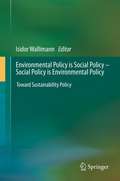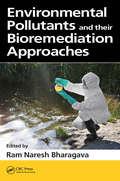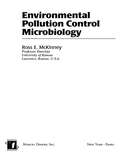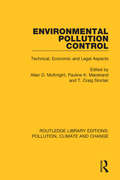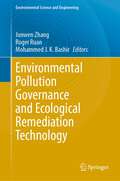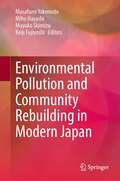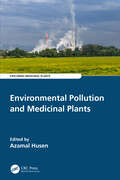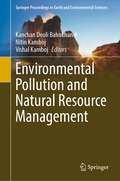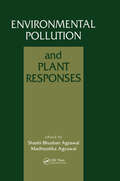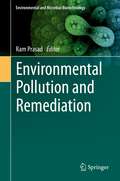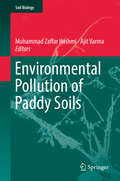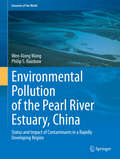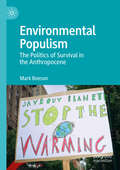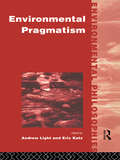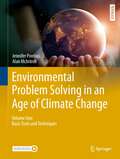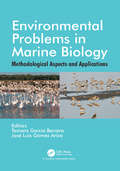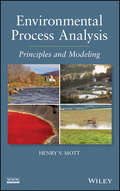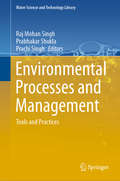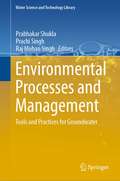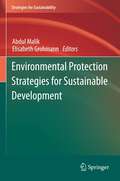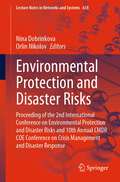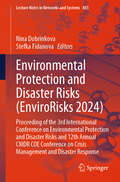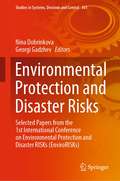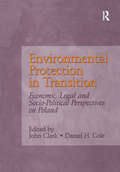- Table View
- List View
Environmental Policy is Social Policy – Social Policy is Environmental Policy
by Isidor WallimannThis book argues that social and environmental policy should be synthetically treated as one and the same field, that both are but two aspects of the same coin - if sustainability is the goal. Such a paradigm shift is indicated, important, and timely to effectively move towards sustainability. This book is the first to take this approach and to give examples for it. Not to synthetically merge the two fields has been and will continue to be highly insufficient, inefficient and contradictory for policy and public administration aiming for a transformation towards a sustainable world. In general, social problems are dealt with in one "policy corner" and environmental problems in another. Rarely is social policy (at large) concerned with its impact on the environment or its connection with and relevance to environmental policy. Equally, environmental problems are generally not seen in conjunction with social policy, even though much environmental policy directly relates to health, nutrition, migration and other issues addressed by social policy. This book intends to correct the pattern to separate these very significant and large policy fields. Using examples from diverse academic and applied fields, it is shown how environmental policy can (and should) be thought of as social policy - and how social policy can (and should) simultaneously be seen as environmental policy. Tremendous benefits are to be expected.
Environmental Pollutants and their Bioremediation Approaches
by Ram Naresh BharagavaThis book is a compilation of detailed and latest knowledge on the various types of environmental pollutants released from various natural as well as anthropogenic sources, their toxicological effects in environments, humans, animals and plants as well as various bioremediation approaches for their safe disposal into the environments. In this book, an extensive focus has been made on the various types of environmental pollutants discharged from various sources, their toxicological effects in environments, humans, animals and plants as well as their biodegradation and bioremediation approaches for environmental cleanup.
Environmental Pollution Control Microbiology: A Fifty-Year Perspective (Civil And Environmental Engineering Ser. #Vol. 16)
by Ross E. McKinneyCompiling knowledge gained through more than 50 years of experience in environmental engineering technology, this book illustrates the application of fundamental concepts in microbiology to provide a sound basis for the design and operation of various biological systems used in solving environmental challenges in the air, water, and soil. Environme
Environmental Pollution Control: Technical, Economic and Legal Aspects
by Allan D. McKnight Pauline K. Marstrand T. Craig SinclairOriginally published in 1974 this volume brings together contributions from lawyers, a nuclear physicist, a landscape architect, biologist, engineers and a former Inspector of the International Atomic Energy Agency. It covers technical and legal information on air, water, sea, land and noise pollution and provides a comprehensive guide, summary and introduction to the journal literature in separate but relevant disciplines. All of the contributors have specialised in studies in pollution control and contributed to the debate on use and management of the environment.
Environmental Pollution Governance and Ecological Remediation Technology (Environmental Science and Engineering)
by Junwen Zhang Roger Ruan Mohammed J. K. BashirThis book provides the advance research results of environmental pollution and governance and covers the main research field of environmental remediation, environmental monitoring, sanitation and so on. Nowadays, environmental pollution, as one of the most important problems in the world, has seriously affected the global ecology, temperature, water resources and so on. Therefore, the research on environmental governance can better help us comprehend the methods and measures of environmental protection and protect our ecology more scientifically and effectively. This book also aims to promote scientific information interchange between scholars from the top universities, research centers and high-tech enterprises working all around the world. It is beneficial to scholars, engineers and researchers in the field of environmental engineering and environmental governance.
Environmental Pollution and Community Rebuilding in Modern Japan
by Keiji Fujiyoshi Masafumi Yokemoto Miho Hayashi Mayuko ShimizuThis book describes how modern industry affected people in Japan and their communities by polluting their living environment with toxic emissions. It also shows how the populace endeavored not only to restore their once-clean environment but also to rebuild communities that had been damaged by pollution and its accompanying effects. Environmental pollution is usually referred to in Japan as kogai, public damage, meaning that such pollution not only harms the physical environment—air, water, soil, and the human body—but also destroys the social and personal relationships in the polluted area. Those people who took action recognized that industrial and economic development had been given the highest national priority even at the cost of their health and welfare. In this sense, anti-kogai movements led them to alternative community development and to rethinking what kind of environment and community they wanted. This book also explores the efforts driven by residents in several parts of Japan after the middle of the twentieth century and the endeavors of museums and archives as a memorial to those who suffered from the pollution and for the prospect of a better society with a good environment.
Environmental Pollution and Medicinal Plants (Exploring Medicinal Plants)
by Azamal HusenEnvironmental Pollution and Medicinal Plants presents information on the impact of environmental pollution on the performance of medicinal plants at various levels including damage detection, adaptation, tolerance, and physiological and molecular responses.This title draws attention not only to seeking new bioactive compounds for herbal drug preparation, but also on ensuring high standards of quality through evaluation of the chemical purity of medicinal plants growing under polluted conditions. It discusses the latest trends and responses of medicinal plants, indicating their tolerance and adaptation to environmental pollution. This book also focuses on secondary metabolites, phytochemicals, and bioactive compounds associated with medicinal plants growing in contaminated conditions.This book will be indispensable for students and professionals working in the field of environmental pollution, medicinal plants, and herbal medicine, as well as for plant biologists, economic botanists, molecular biologists, and biotechnologists.. KEY FEATURES Explains the global trend of environmental pollution and its impact on medicinal herbs with the help of clear text and attractive illustrations. Provides a comprehensive overview of medicinal plants and their interaction with environmental pollution in terms of damage detection, repair, acclimation, tolerance, adaptation, and physiological responses. Discusses the production of secondary metabolites, phytochemicals, and bioactive compounds (used for herbal drug preparation) in medicinal plants growing in the vicinity of contamination and pollution load. Highlights opportunities and future challenges in "omics" studies on medicinal plants.
Environmental Pollution and Natural Resource Management (Springer Proceedings in Earth and Environmental Sciences)
by Kanchan Deoli Bahukhandi Nitin Kamboj Vishal KambojThis book presents conference articles related to environmental pollution and natural resource management, and environmentally friendly technologies that lead to sustainable development presented in the Conference "Sustainable Management of Environment & Natural Resource Through Innovation in Science and Technology". The book highlights the latest development and innovation in environmental science, technology, and interdisciplinary research to improve the environment and health safety. It includes innovations and improvisations in the broad area of science and technology, natural resource, and environment management. It deliberates on the current burning issues of environment protection management and sustainable development, environmental pollution, global warming, and climate change.The development strategies must therefore be shaped by the following components:The satisfaction of basic human requirementsThe eradication of povertySelf-reliant and participatory developmentEnvironmental consciousnessTechnology has to play a critical role in the process of changing industrial society. But innovation has to be embedded in social and organizational innovation. This book provides a wide range of research articles in the area of science and technology, sustainability, natural resource management, ecology and its environmental fields, geosciences and geology, atmospheric sciences, sustainability, climate change, and extreme weather, global warming, and environmental change, the effect of climate change on the ecosystem, environment, and pollution.
Environmental Pollution and Plant Responses
by Madhoolika Agrawal Shashi Bhushan AgrawalComprehensive and global in scope, Environmental Pollution and Plant Responses provides an analysis of the research on the factors contributing to the deteriorating environmental quality and its effect on plant performance. The issues include: environmental pollution and global climate change, response patterns of plants at different levels, mechanisms of interaction, tolerance strategies and future research prospects. The author evaluates trends and gives management strategies for abating the problem. This volume highlights the complexities of environmental problems and the affect of pollution on every level of the ecosystem.
Environmental Pollution and Remediation (Environmental and Microbial Biotechnology)
by Ram PrasadThis book presents state-of-the-art environmental remediation processes. Environmental protection and management is a global concern, especially in the context of industrial regions. Over the years, several conventional, engineering-based physicochemical decontamination methods have used in the remediation of polluted sites. However, these methods are expensive and have limited efficiency. Drawing on research and examples from around the world, this book offers a comprehensive review of and insights into green technologies and sustainable remediation alternatives. It discusses the emerging importance of nanotechnology, chemo and biosensors, indicator species, microbe-based remediation of organic compounds, and ex-situ remediation methods. Addressing the growing global need for a holistic overview of the environmental remediation of polluted sites, it will appeal to teachers, researchers, scientists, capacity builders, and policymakers. It also serves as additional reading material for undergraduate and graduate students of biotechnology and environmental sciences.
Environmental Pollution of Paddy Soils (Soil Biology #53)
by Ajit Varma Muhammad Zaffar HashmiThe paddy field is a unique agro-ecosystem and provides services such as food, nutrient recycling and diverse habitats. However, chemical contamination of paddy soils has degraded the quality of this important ecosystem. This book provides an overview of our current understanding of paddy soil pollution, addressing topics such as the major types of pollutants in contaminated paddy soil ecosystems; factors affecting the fate of pollutants in paddy soil; biomonitoring approaches to assess the contaminated paddy soil; the impact of chemicals on soil microbial diversity; and climate change. It also covers arsenic and heavy metal pollution of paddy soils and their impact on rice quality. Further, new emerging contaminants such as antibiotics and antibiotics resistance genes (ARGs) in paddy soil and their impact on environmental health are also discussed. The last chapters focus on the bioremediation approaches for the management of paddy soils.
Environmental Pollution of the Pearl River Estuary, China: Status and Impact of Contaminants in a Rapidly Developing Region (Estuaries of the World)
by Philip S. Rainbow Wen-Xiong WangThe Pearl River Estuary (PRE) is the Western name for a very large estuary in southern China that is currently home to an industrial metropolis of staggering size, and one that is rapidly evolving. The Chinese name for the Pearl River is Zhujiang. Guangzhou lies at the head of the estuary, and Macau and Hong Kong are on the western and eastern sides, respectively, of the wide opening of the estuary to the South China Sea. The new cities of Zhuhai and Shenzhen lie immediately north of Macau and Hong Kong, respectively. The recent establishment of the Greater Bay Area (GBA), which covers the majority of the Pearl River Delta area, with a total population of over 70 million, will certainly put the PRE under strict environmental scrutiny. The PRE system itself will provide a model system for environmental scientists owing to its major anthropogenic perturbation and influences, as well as the highly dynamic nature of the estuary. This book addresses the major environmental concerns regarding this estuary, contaminants and other pollutants, e.g. toxic metals, organic contaminants and emerging compounds. Questions addressed here include: What are the sources of the contaminants? What have the environmental consequences of these contaminants been for the estuary? What will the future bring? The research presented here on the Pearl River Estuary offers a wealth of insights for other major contaminated estuaries around the world.
Environmental Populism: The Politics of Survival in the Anthropocene
by Mark BeesonThis book evaluates climate change and populism, two ideas that do not generally go together. The author argues that perhaps they should if policymakers are to be galvanized into action before it is too late. Although populism is usually associated with right-wing authoritarianism, there is growing interest in more progressive forms of populist politics. Across the world, young people in particular are mobilizing to demand change from an older generation that appears to be incapable of action or is hostage to powerful vested interests and outdated ideas. In this book, the author explains why populist forms of political action may yet provide the key to effective policies, which are often discussed but less frequently implemented. Accessible and trenchantly argued, this book presents a primer for the politics of survival.
Environmental Pragmatism (Environmental Philosophies)
by Andrew Light Eric KatzEnvironmental pragmatism is a new strategy in environmental thought. It argues that theoretical debates are hindering the ability of the environmental movement to forge agreement on basic policy imperatives. This new direction in environmental thought moves beyond theory, advocating a serious inquiry into the merits of moral pluralism. Environmental pragmatism, as a coherent philosophical position, connects the methodology of classical American pragmatic thought to the explanation, solution and discussion of real issues. This concise, well-focused collection is the first comprehensive presentation of environmental pragmatism as a new philosophical approach to environmental thought and policy.
Environmental Problem Solving in an Age of Climate Change: Volume One: Basic Tools and Techniques (Springer Textbooks in Earth Sciences, Geography and Environment)
by Jennifer Pontius Alan McIntoshThis textbook provides an opportunity for undergraduate students studying the environment to work on addressing real-world environmental problems and practice the disciplinary and professional skills necessary to tackle complex issues. Each of the 12 units that comprise the heart of this workbook-style text focus on a specific environmental challenge directly or indirectly tied to climate change. Students are guided through activities that require them to review relevant environmental content knowledge, practice an array of learning outcome-based skills, evaluate potential solutions, and advocate for action. An important feature of the book is its problem-based approach, using climate change as a common lens through which to view an array of current environmental challenges. Showing students how they might apply their core knowledge and disciplinary skills to identify possible solutions demonstrates the utility of science to inform decision making and builds student competency in learning outcomes common across environmental academic programs. Designed to provide problem-area options to match student interests (from sea turtle conservation to climate migrants to urban heat islands), instructors can choose among units to best engage students, or work through units sequentially to scaffold instruction while building student capacity. Each unit contains activities that focus on: (1) Discovery, where students are guided through exploration to build their knowledge of the issue and prepare a formal Problem Statement;(2) Analysis, where students dig into relevant data and begin to evaluate potential solutions; and(3) Solutions, where students practice their problem solving, decision making and environmental communication skills. Environmental Problem Solving in an Age of Climate Change underscores the pervasive nature of climate change as a common factor in all environmental issues. The book demonstrates how sustainable solutions require the efforts of many people working on smaller, more tangible issues to tackle the grand challenge that climate change presents.
Environmental Problems in Marine Biology: Methodological Aspects and Applications
by Tamara Garcia Barrera Jose Luis ArizaMarine environment can be affected by several pollutants such as the presence of elements and their chemical species, pharmaceuticals, nanoparticles and other emerging contaminants. Environmental monitoring can be assessed by genomics, proteomics (i.e. redox proteomics), chemical speciation analysis and metallomics, metabolomics as well as other advanced strategies. The present book is a useful methodological tool for researchers and specialists in the field of analytical chemistry, environmental sciences, biochemistry, genomics and toxicology. The book includes for the first time the methodological aspects and applications related to chemical speciation and –omics strategies applied to marine environment.
Environmental Process Analysis
by Henry V. MottEnables readers to apply core principles of environmental engineering to analyze environmental systemsEnvironmental Process Analysis takes a unique approach, applying mathematical and numerical process modeling within the context of both natural and engineered environmental systems. Readers master core principles of natural and engineering science such as chemical equilibria, reaction kinetics, ideal and non-ideal reactor theory, and mass accounting by performing practical real-world analyses. As they progress through the text, readers will have the opportunity to analyze a broad range of environmental processes and systems, including water and wastewater treatment, surface mining, agriculture, landfills, subsurface saturated and unsaturated porous media, aqueous and marine sediments, surface waters, and atmospheric moisture.The text begins with an examination of water, core definitions, and a review of important chemical principles. It then progressively builds upon this base with applications of Henry's law, acid/base equilibria, and reactions in ideal reactors. Finally, the text addresses reactions in non-ideal reactors and advanced applications of acid/base equilibria, complexation and solubility/dissolution equilibria, and oxidation/reduction equilibria.Several tools are provided to fully engage readers in mastering new concepts and then applying them in practice, including:Detailed examples that demonstrate the application of concepts and principlesProblems at the end of each chapter challenging readers to apply their newfound knowledge to analyze environmental processes and systemsMathCAD worksheets that provide a powerful platform for constructing process modelsEnvironmental Process Analysis serves as a bridge between introductory environmental engineering textbooks and hands-on environmental engineering practice. By learning how to mathematically and numerically model environmental processes and systems, readers will also come to better understand the underlying connections among the various models, concepts, and systems.
Environmental Processes and Management: Tools and Practices (Water Science and Technology Library #91)
by Prachi Singh Raj Mohan Singh Prabhakar ShuklaThis book presents an in-depth, science-based approach to applying key project-management and spatial tools and practices in environmental projects. Providing important data for those considering projects that balance social-economic growth against minimizing its ill-effects on planet Earth, the book discusses various aspects of environmental engineering, as well as formula and analytical approaches required for more informed decision-making. Beginning with a broad overview of the factors and features of environmental processes and management, the book then clearly details the general application of fundamental processes, the characteristics of the different systems in which they occur, and the way in which these factors influence process dynamics, environmental systems, and their possible remedies. While primarily intended for professionals responsible for the management of environmental projects or interested in improving the overall efficiency of such projects, it is also useful for managers in the private, public, and not-for-profit sectors. Further, it is a valuable resource for students at both undergraduate and postgraduate levels, and an indispensable guide for anyone wanting to develop their skills in modern environmental management and related techniques.
Environmental Processes and Management: Tools and Practices for Groundwater (Water Science and Technology Library #120)
by Prachi Singh Raj Mohan Singh Prabhakar ShuklaThis book is Volume 2 which is published to complement "Environmental Processes and Management: Tools and Practices" (https://link.springer.com/book/10.1007/978-3-030-38152-3), 2020This book provides an in-depth, well-researched and science-based approach to applying key project management and spatial tools and practices in environmental projects. This book is an important read for leaders considering projects that balance social–economic growth against minimizing its ill effects on Planet Earth. This book brings together several aspects of groundwater engineering, as well as the formula and analytical approaches required for more informed decision-making. It also highlights the vital importance of understanding the technological, economic and social dimensions of environmental studies explained through dynamic approaches and illustrative figures that have short-term results and long-term impacts. This book emphasizes on encouraging the modern and vibrant research works conducted by young researchers across the world. This book clearly details the general application of fundamental groundwater processes, the character of the different types of systems in which they occur and the way in which these factors influence process dynamics, environmental systems and their possible remedies. The book sets a possible recommendation for the professionalism with which environmental research should be planned, executed, monitored, assessed and delivered. While primarily intended for professionals responsible for the management of groundwater projects or interested in improving the overall efficiency of such projects, it is also useful for managers in the private, public and not-for-profit sectors. The book is a valuable resource for students at both undergraduate and postgraduate levels. In addition, this book serves as an indispensable guide for anyone willing to develop their skills in modern groundwater / environmental management and related techniques
Environmental Protection Strategies for Sustainable Development
by Elisabeth Grohmann Abdul MalikThe environment of our planet is degrading at an alarming rate because of non-sustainable urbanization, industrialization and agriculture. Unsustainable trends in relation to climate change and energy use, threats to public health, poverty and social exclusion, demographic pressure and ageing, management of natural resources, biodiversity loss, land use and transport still persist and new challenges are arising. Since these negative trends bring about a sense of urgency, short term action is required, whilst maintaining a longer term perspective. The main challenge is to gradually change our current unsustainable consumption and production patterns and the nonintegrated approach to policy-making. This book covers the broad area including potential of rhizospheric microorganisms in the sustainable plant development in anthropogenic polluted soils, bioremediation of pesticides from soil and waste water, toxic metals from soil, biological treatment of pulp and paper industry wastewater, sustainable solutions for agro processing waste management, solid waste management on climate change and human health, environmental impact of dyes and its remediation. Various methods for genotoxicity testing of environmental pollutants are also discussed and chapters on molecular detection of resistance and transfer genes in the environmental samples, biofilm formation by the environmental bacteria, biochemical attributes to assess soil ecosystem sustainability, application of rhizobacteria in biotechnology, role of peroxidases as a tool for the decolorization and removal of dyes and potential of biopesticides in sustainable agriculture. It offers a unique treatment of the subject, linking various protection strategies for sustainable development, describing the inter-relationships between the laboratory and field eco-toxicologist, the biotechnology consultant, environmental engineers and different international environmental regulatory and protection agencies.
Environmental Protection and Disaster Risks: Proceeding of the 2nd International Conference on Environmental Protection and Disaster Risks and 10th Annual CMDR COE Conference on Crisis Management and Disaster Response (Lecture Notes in Networks and Systems #638)
by Orlin Nikolov Nina DobrinkovaThis book presents topics that are challenging fields that scientific world is trying to address as much as it can. Earthquakes, floods, fires, droughts, blizzards, dust storms, natural releases of toxic gases and liquids, diseases, and other environmental variations affect hundreds of millions of people each year. Many disaster events are triggered by human activities. Dealing with these problems will require systems thinking and integrating multidisciplinary science. Actions in these directions are taken more and more in the recent years by political bodies, NGOs, and scientific groups trying to find sustainable solutions for the future generations. Every point of view matters when it comes to our global home—The Planet Earth. The book presents research findings and conclusions that have been developed as algorithms or new methods solving problems in the fields of disaster management, natural hazards, risk reduction and building resilience, climate change challenges and security implications, air pollution and health, water resources and management and informatics, remote sensing, GIS, and high-performance computing. The 2nd International Conference on Environmental Protection and Disaster Risks in combination with the 10th Annual CMDR COE Conference on Crisis Management and Disaster Response brought together in the period June 06-09, 2022, in Sofia, Bulgaria scientists who presented their findings in the fast developing environmental management and disaster risk reduction field.
Environmental Protection and Disaster Risks: Proceeding of the 3rd International Conference on Environmental protection and Disaster Risks and 12th Annual CMDR COE Conference on Crisis management and Disaster Response (Lecture Notes in Networks and Systems #883)
by Stefka Fidanova Nina DobrinkovaThis book is a comprehensive collection of extended contributions from the 3rd International Conference on Environmental Protection and Disaster Risks and the 12th Annual CMDR COE Conference on Crisis Management and Disaster Response held in the period June 4–6, 2024, in Sofia, Bulgaria, as a hybrid participation event. Environmental protection and disaster risk topics are challenging fields, that scientific world is trying to address. Earthquakes, floods, fires, droughts, blizzards, dust storms, natural releases of toxic gases and liquids, diseases, and other environmental variations affect hundreds of millions of people each year. Many disaster events are triggered by human activities. Dealing with these problems requires a multidisciplinary scientific approach. Actions in these directions are taken more and more in the recent years by political bodies, NGOs, and scientific groups trying to find sustainable solutions for the future generations. Every point of view matters when it comes to our global home—The Planet Earth. This book presents recent advances in the topics: disaster management, natural hazards, risk reduction, and building resilience; climate change challenges and security implications; resilience and business continuity management; high-performance computing, modeling and simulations, GIS for environmental monitoring and artificial intelligence. The book is focused on important large-scale applications like environmental and climate modeling, computational optimizations and algorithms for specific hazard situations analyses.
Environmental Protection and Disaster Risks: Selected Papers from the 1st International Conference on Environmental Protection and Disaster RISKs (EnviroRISKs) (Studies in Systems, Decision and Control #361)
by Nina Dobrinkova Georgi GadzhevThis book presents research findings and conclusions that has been developed as algorithms or intelligent new methods solving problems in the fields of air pollution, climate and health, natural hazards and risks, water resources, human activities and management and informatics, remote sensing, high-performance computing and GIS for environmental monitoring and management. Environmental protection and disaster risk topics are challenging fields, that scientific world is trying to address as much as it can. Earthquakes, floods, fires, droughts, blizzards, dust storms, natural releases of toxic gases and liquids, diseases and other environmental variations affect hundreds of millions of people each year. Many disaster events are triggered by human activities. Dealing with these problems will require systems thinking and integrating multidisciplinary science. Actions in these directions are taken more and more in the recent years by political bodies, NGOs and scientific groups trying to find sustainable solutions for the future generations. Every point of view matter when it comes to our global home – The Planet Earth.
Environmental Protection and Sustainable Ecological Development: Proceedings of the 2014 International Conference on Environmental Protection and Sustainable Ecological Development (EPSED 2014), Wuhan, Hubei, China, October 24-26, 2014
by Jiaxing ZhangThis volume contains the papers presented at the 2014 International Conference on Environmental Protection and Sustainable Ecological Development (EPSED2014). The contributions cover the latest research results and explore new areas of research and development, like Earth Science, Resource Management, Environmental Protection, and Sustainable
Environmental Protection in Transition: Economic, Legal and Socio-Political Perspectives on Poland
by John Clark Daniel H. ColeThis book takes an interdisciplinary look at environmental protection during Poland’s transition to market democracy. The contributors are recognised experts in their fields, making this an authoritative volume, combining the perspectives of economists, legal scholars, political scientists and sociologists.
